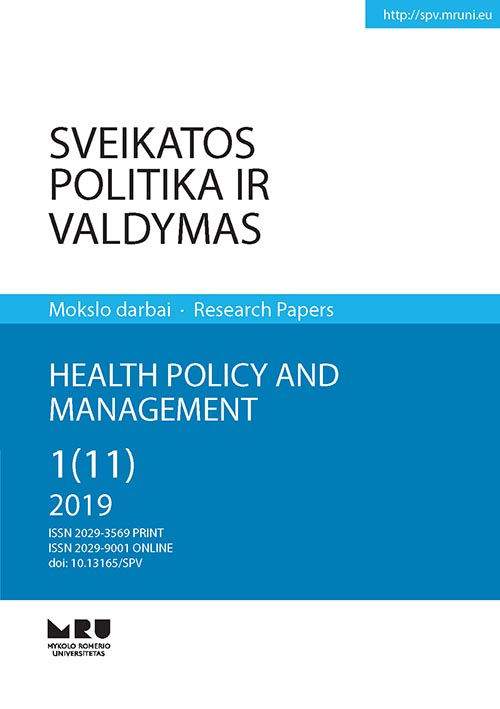MANAGEMENT OF TYPE 2 DIABETES MELLITUS AT PRIMARY HEALTH CARE LEVEL IN LITHUANIA
##plugins.themes.bootstrap3.article.main##
Abstract
Background. Type 2 diabetes mellitus (T2DM) is a complex disease that leads to continuous medical care with comprehensive, multifactorial strategies for reducing disease risk for patients. There is an ongoing discussion on how to better manage chronic diseases at primary
health care facility level. It is recognized that continuous management of chronic diseases needs to find new ways in managing risk and outcomes of chronic diseases.
Aim of the study. To find the elements of value creation management with perspectives of priorities management and to examine the impact of factors on chronic diseases state with prognosis of T2DM progress in primary health care.
Materials and methods. The methods of the research were based on the group discussions of managers from primary health care and the survey of patients with T2DM that was conducted after the consultation of family doctor in primary health care facilities in Lithuania. Focus group discussions (n = 48) were conducted from May 2015 to March 2016 in 10 counties of Lithuania (31 executives of public primary health care facilities and 17 executives of private primary health care facilities). From October 2017 to January 2018, the survey of patients (n = 510) with T2DM was conducted (258 from public and 252 from primary health care facilities). Multinomial logistic regression was used for the analysis.
Results. The main elements of value management with focus on chronic diseases management were health promotion, quality of life, time management, satisfaction, communication, partnership with health care professionals, values and lifestyle of patients. Significant distribution among sociodemographic (income, place of residence, gender), non - clinical (affiliation to primary health care facility, self - perceived health, satisfaction with T2DM treatment, treatment options) factors were investigated. Age, gender, place of residence, self - perceived health, education, treatment options of T2DM were the factors that predicts the prognosis of T2DM progress.
Conclusions. The foundation of value elements with perspectives of priorities management provides insights to develop interventions programs and projects that would increase patient satisfaction with primary health care services. The factors evaluation on T2DM progress is the opportunity to find effective management tools that helps predict a disease evolution. The prediction of T2DM is basis for clinicians and managers in priorities setting and decision making. The results of the research can be ground for the continuous management of T2DM disease improvement in primary health care facility. The determination of elements of value management, the distribution of factors among T2DM disease states, the factors examination on chronic diseases states can be the principles of building theories.
health care facility level. It is recognized that continuous management of chronic diseases needs to find new ways in managing risk and outcomes of chronic diseases.
Aim of the study. To find the elements of value creation management with perspectives of priorities management and to examine the impact of factors on chronic diseases state with prognosis of T2DM progress in primary health care.
Materials and methods. The methods of the research were based on the group discussions of managers from primary health care and the survey of patients with T2DM that was conducted after the consultation of family doctor in primary health care facilities in Lithuania. Focus group discussions (n = 48) were conducted from May 2015 to March 2016 in 10 counties of Lithuania (31 executives of public primary health care facilities and 17 executives of private primary health care facilities). From October 2017 to January 2018, the survey of patients (n = 510) with T2DM was conducted (258 from public and 252 from primary health care facilities). Multinomial logistic regression was used for the analysis.
Results. The main elements of value management with focus on chronic diseases management were health promotion, quality of life, time management, satisfaction, communication, partnership with health care professionals, values and lifestyle of patients. Significant distribution among sociodemographic (income, place of residence, gender), non - clinical (affiliation to primary health care facility, self - perceived health, satisfaction with T2DM treatment, treatment options) factors were investigated. Age, gender, place of residence, self - perceived health, education, treatment options of T2DM were the factors that predicts the prognosis of T2DM progress.
Conclusions. The foundation of value elements with perspectives of priorities management provides insights to develop interventions programs and projects that would increase patient satisfaction with primary health care services. The factors evaluation on T2DM progress is the opportunity to find effective management tools that helps predict a disease evolution. The prediction of T2DM is basis for clinicians and managers in priorities setting and decision making. The results of the research can be ground for the continuous management of T2DM disease improvement in primary health care facility. The determination of elements of value management, the distribution of factors among T2DM disease states, the factors examination on chronic diseases states can be the principles of building theories.
##plugins.themes.bootstrap3.article.details##
Section
Articles
Authors contributing to Health policy and management agree to publish their articles under a Creative Commons Attribution-NoDerivatives 4.0 International Public (CC BY-NC-ND) License, allowing third parties to share their work (copy, distribute, transmit) and to adapt it, under the condition that the authors are given credit, and that in the event of reuse or distribution, the terms of this licence are made clear.








